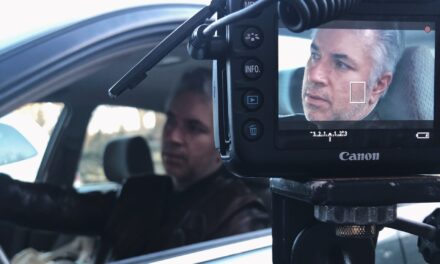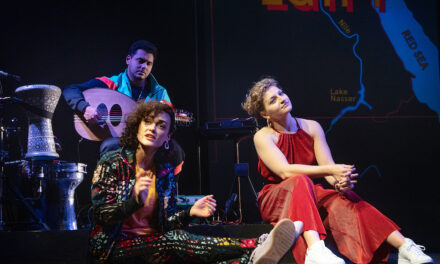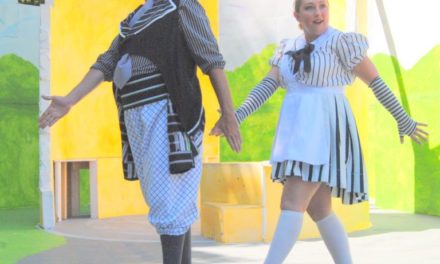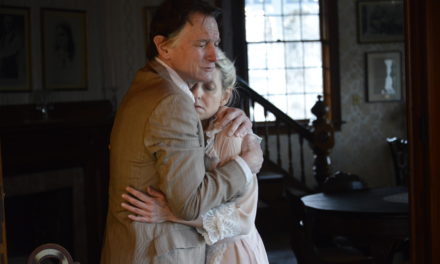Although the idea of deporting people to Rwanda as a punishment is now, following the defeat of the Tories in this year’s General Election, off the political agenda, the way we as a society treat prisoners remains a deeply troubling issue. In the week that Rachel O’Riordan, this venue’s artistic director, opens her revival of Timberlake Wertenbaker’s 1988 masterpiece Our Country’s Good, the issue of prison overcrowding has reached crisis point in the UK. So the line in the play about transportation as a solution to full jails gets a murmur of recognition from the audience.
Based on the extraordinary true story of the British Empire’s remotest penal colony, and adapted from Thomas Keneally’s superb 1987 novel The Playmaker, Wertenbaker’s version shows how a group of transported British convicts arrive in Sydney Cove, New South Wales, and eventually perform George Farquhar’s 1706 hit, The Recruiting Officer, to an audience of prisoners and jailers in 1789. Within this simple plot, Wertenbaker adds small and tender scenes of daily life amid the big set-pieces when the officers discuss the play and when the convict cast rehearses it. And for this production, she has also — in collaboration with Ian Michael — made changes to the text to give a greater voice to Australia’s First Nations People.
The play opens with a convict being punished with 50 lashes, a horrible moment staged under a huge faded and tired Union Jack flag. The penal colony’s governor, Captain Arthur Phillip, is an Enlightenment ruler who manages both officers and convicts with a mixture of a smiling face and a firm hand. He supports Second Lieutenant Ralph Clarke, who acts as The Recruiting Officer’s director, and there is a lot of comedy that comes from his attempts to drill his cast of hardened working-class criminals. These include Wisehammer the budding writer, Sideway the pickpocket, Ketch the hangman, Black Caesar, angry Liz Morden, and Devonshire woman Dabby.
While Ralph directs the play, he falls in love with the prisoner Mary Brenham, and at the same time jealous Harry Brewer, another convict, is in a tormented relationship with young Duckling. Meanwhile, there’s an important episode in which the feisty Liz is threatened with death by hanging when she refuses to defend herself against charges of stealing food from the precarious colony’s precious store. All of these events are watched by Killara, an indigenous woman, who laments the brutal invasion of her land. Her part has been increased with the addition of words from the Dharug and Dharwawal language, giving the character a much stronger stage presence.
Wertenbaker’s text is rich in insight — with jokes about acting, theatre-going, national identity, and more serious asides about colonialism, women’s bodies and the injustice of brutalizing punishment — and her skill lies in her blending of the twin themes of the power of penal rehabilitation and the joy of theatre. From the early sexual longings of the convicts, through the long debate, with quotations from Jean-Jacques Rousseau and Plato, of the officers as they discuss the usefulness of putting on a show, to the transformative scene of the prisoners preparing for their entry on the stage, this is a fascinating story, which, despite a few clunky lines, is beautifully told.
In today’s society, with its overflowing prisons, threatened theatres and increased sensitivity about colonial brutality and violence against women, Our Country’s Good — with its the punning title feeling increasingly ironic — is remarkably relevant. The deeply emotional sense of justice denied, and the tensions between individualism and collectivity, come across as strongly as ever, while the comic moments remain brightly entertaining. And there’s still a distinctly idealistic glow about the anti-establishment vibe that runs through the text. It feels warm and wonderful. That said, this particular production could certainly be improved.
O’Riordan’s staging is designed by Gary McCann, who mixes — not always very elegantly — the costumes of 18th-century colonial life with modern dress. But the real disappointment is her uncertain directing, in which the actors often drift aimlessly across the stage or fail to connect with each other, or seem to have an odd variety of acting styles from different shows. These awkward bits are not helped by McCann’s underused mountainside set, soon despoiled by empty beer cans and other imperialistic garbage, and Holly Khan’s loudly intrusive music. O’Riordan, as usual with this play, uses doubling, but she could have made the scenes with the officers less informal and more soldiery, and toned down some of the more shouty passages of convict life.
The large cast features Naarah’s open-hearted Killara, Catrin Aaron’s smouldering Liz Morden, Ruby Benthall’s shy but gradually more confident Mary Brenham, Aliyah Odoffin’s passionate Duckling, and Nicola Stephenson’s feisty Dabby. The men are Jack Bardoe as the haunted Harry Brewer, Nick Fletcher as the clever Sideway, Harry Kershaw as the intellectual Wisehammer, Finbar Lynch as the sinister if gentle Ketch, and Olivier Hubbard as Caesar. The actors double as officers, including Kershaw as Phillip and Lynch as the incisively sceptical Major Ross. In several scenes Simon Manyonda is good as Ralph. If the production is a bit messy, the play still speaks loudly to us today.
- Our Country’s Good is at the Lyric Hammersmith until 5 October.
This post was written by the author in their personal capacity.The opinions expressed in this article are the author’s own and do not reflect the view of The Theatre Times, their staff or collaborators.
This post was written by Aleks Sierz.
The views expressed here belong to the author and do not necessarily reflect our views and opinions.


















